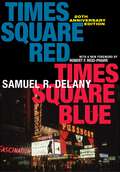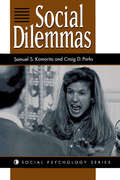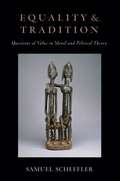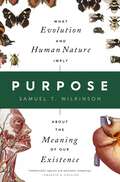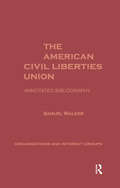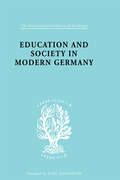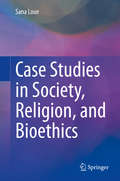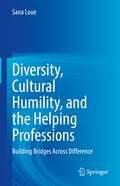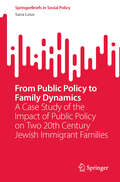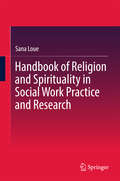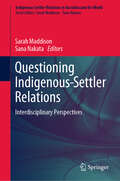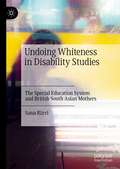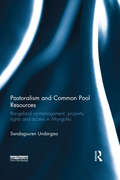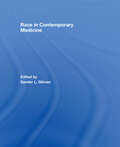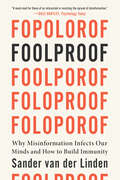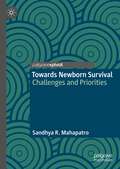- Table View
- List View
Intimate Partner Violence: Clinical Interventions With Partners And Their Children
by Samuel R. AymerIntimate Partner Violence: Clinical Interventions with Partners and Their Children brings into focus an ecological and clinical frame for addressing the resulting psychological effects of intimate partner violence (IPV). Aymer presents a perspective that is often omitted from social science textbooks which are geared to policy practice, tending to expose students to macro-systemic ideas (including criminal justice policies and procedures) relative to IPV. However, this book expands clinical practice pedagogy by reinforcing the need for students to go beyond macro issues in order to deliver competent clinically-based interventions that help partners and their children work through the consequential effects of partner violence. Designed for graduate students in social work, psychology, gender studies and allied mental health programs, it expands the discourse, arguing that IPV is a complex psycho-social-political-relational problem that must be understood from a multi-theoretical perspective. Through case studies, theory, research, and the author's clinical practice wisdom, this text will: increase understanding of how to work clinically with women affected by IPV, increase knowledge of how to work with abusive men, heighten knowledge of how IPV affects children and adolescents, expand knowledge of social and cultural notions, and explore men's role in terms of advocating against gender-based violence.
Times Square Red, Times Square Blue
by Samuel R. DelanyIf one street in America can claim to be the most infamous, it is surely 42nd Street. Between Seventh and Eighth Avenues, 42nd Street was once known for its peep shows, street corner hustlers and movie houses. Over the last two decades the notion of safety-from safe sex and safe neighborhoods, to safe cities and safe relationships-has overcome 42nd Street, giving rise to a Disney store, a children's theater, and large, neon-lit cafes. 42nd Street has, in effect, become a family tourist attraction for visitors from Berlin, Tokyo, Westchester, and New Jersey's suburbs.Samuel R. Delany sees a disappearance not only of the old Times Square, but of the complex social relationships that developed there: the points of contact between people of different classes and races in a public space. In Times Square Red, Times Square Blue, Delany tackles the question of why public restrooms, peepshows, and tree-filled parks are necessary to a city's physical and psychological landscape. He argues that starting in 1985, New York City criminalized peep shows and sex movie houses to clear the way for the rebuilding of Times Square. Delany's critique reveals how Times Square is being "renovated" behind the scrim of public safety while the stage is occupied by gentrification. Times Square Red, Times Square Blue paints a portrait of a society dismantling the institutions that promote communication between classes, and disguising its fears of cross-class contact as "family values." Unless we overcome our fears and claim our "community of contact," it is a picture that will be replayed in cities across America.
Times Square Red, Times Square Blue 20th Anniversary Edition (Sexual Cultures #47)
by Samuel R. DelanyTwentieth anniversary edition of a landmark book that cataloged a vibrant but disappearing neighborhood in New York CityIn the two decades that preceded the original publication of Times Square Red, Times Square Blue, Forty-second Street, then the most infamous street in America, was being remade into a sanitized tourist haven. In the forced disappearance of porn theaters, peep shows, and street hustlers to make room for a Disney store, a children’s theater, and large, neon-lit cafes, Samuel R. Delany saw a disappearance, not only of the old Times Square, but of the complex social relationships that developed there.Samuel R. Delany bore witness to the dismantling of the institutions that promoted points of contact between people of different classes and races in a public space, and in this hybrid text, argues for the necessity of public restrooms and tree-filled parks to a city's physical and psychological landscape.This twentieth anniversary edition includes a new foreword by Robert Reid-Pharr that traces the importance and continued resonances of Samuel R. Delany’s groundbreaking Times Square Red, Times Square Blue.
Social Dilemmas: Understanding Human Cooperation (Social Psychology Ser.)
by Samuel S KomoritaEmphasizing real-world examples, Komorita and Parks illustrate both the theoretical and the ecological relevance of social dilemmas, focusing on "exchange theory" to explain how conflicts are resolved. This book is appropriate for students of psychology, political science, and sociology.
Toxic Beauty: How Cosmetics and Personal-Care Products Endanger Your Health... and What You Can Do About It
by Samuel S. EpsteinSplashy ads and commercials for personal care products are everywhere we turn, promising to keep our appearances fresh and our partners satisfied. But do consumers really know what they're applying to their faces and bodies in their quests for youth and beauty? Do they know the health risks they're taking by simply applying lipstick, face moisturizer or deodorant? Toxic cosmetics and personal care products clutter the shelves at retail stores everywhere, and consumers don't know the avoidable risks they're taking by following a simple beauty regimen. Written by Dr. Samuel S. Epstein, a founder and chairperson of the Cancer Prevention Coalition, Toxic Beauty gives the lowdown on salon safety, health risks hiding in everyday products, how we put our children in danger and more. Toxic Beauty will also educate you and your family on easily implemented solutions through the use of a variety of positive alternatives. Through the help of Dr. Epstein and Toxic Beauty, you can protect yourself from the possible long-term effects of a simple beauty product.
Antisemitismustheorien (essentials)
by Samuel SalzbornDas Buch fasst die theoretischen Erkenntnisse der sozialwissenschaftlichen Antisemitismusforschung zusammen. Berücksichtigt werden dabei die Mikro-, die Meso- und die Makroebene, was psychologische, soziologische und politikwissenschaftliche/philosophische Ansätze umfasst. Dargestellt werden Fragen des Individuums und der antisemitischen Persönlichkeit, der sozialen Vermittlung in Kultur, Gesellschaft und Masse sowie der gesellschaftlichen, ökonomischen und politischen Strukturen.
Equality and Tradition: Questions of Value in Moral and Political Theory
by Samuel SchefflerThis collection of essays by noted philosopher Samuel Scheffler combines discussion of abstract questions in moral and political theory with attention to the normative dimension of current social and political controversies. In addition to chapters on more abstract issues such as the nature ofhuman valuing, the role of partiality in ethics, and the significance of the distinction between doing and allowing, the volume also includes essays on immigration, terrorism, toleration, political equality, and the normative significance of tradition. Uniting the essays is a shared preoccupation with questions about human value and values. The volume opens with an essay that considers the general question of what it is to value something - as opposed, say, to wanting it, wanting to want it, or thinking that it is valuable. Other essays exploreparticular values, such as equality, whose meaning and content are contested. Still others consider the tensions that arise, both within and among individuals, in consequence of the diversity of human values. One of the overarching aims of the book is to illuminate the different ways in whichliberal political theory attempts to resolve conflicts of both of these kinds.
Capital City: Gentrification and the Real Estate State (Jacobin)
by Samuel Stein“This superbly succinct and incisive book couldn’t be more timely or urgent.”—Michael Sorkin, author of All Over the MapOur cities are changing. Around the world, more and more money is being invested in buildings and land. Real estate is now a $217 trillion dollar industry, worth thirty-six times the value of all the gold ever mined. It forms sixty percent of global assets, and one of the most powerful people in the world—the president of the United States—made his name as a landlord and developer.Samuel Stein shows that this explosive transformation of urban life and politics has been driven not only by the tastes of wealthy newcomers, but by the state-driven process of urban planning. Planning agencies provide a unique window into the ways the state uses and is used by capital, and the means by which urban renovations are translated into rising real estate values and rising rents.Capital City explains the role of planners in the real estate state, as well as the remarkable power of planning to reclaim urban life.
Purpose: What Evolution and Human Nature Imply about the Meaning of Our Existence
by Samuel T. WilkinsonBy using principles from a variety of scientific disciplines, Yale Professor Samuel Wilkinson provides a framework for human evolution that reveals an overarching purpose to our existence. Generations have been taught that evolution implies there is no overarching purpose to our existence, that life has no fundamental meaning. We are merely the accumulation of tens of thousands of intricate molecular accidents. Some scientists take this logic one step further, suggesting that evolution is intrinsically atheistic and goes against the concept of God. But is this true? By integrating emerging principles from a variety of scientific disciplines—ranging from evolutionary biology to psychology—Yale Professor Samuel Wilkinson provides a framework of evolution that implies not only that there is an overarching purpose to our existence, but what this purpose is. With respect to our evolution, nature seems to have endowed us with competing dispositions, what Wilkinson calls the dual potential of human nature. We are pulled in different directions: selfishness and altruism, aggression and cooperation, lust and love. When we couple this with the observation that we possess a measure of free will, all this strongly implies there is a universal purpose to our existence. This purpose, at least one of them, is to choose between the good and evil impulses that nature has created within us. Our life is a test. This is a truth, as old as history it seems, that has been espoused by so many of the world&’s religions. From a certain framework, these aspects of human nature—including how evolution shaped us—are evidence for the existence of a God, not against it. Closely related to this is meaning. What is the meaning of life? Based on the scientific data, it would seem that one such meaning is to develop deep and abiding relationships. At least that is what most people report are the most meaningful aspects of their lives. This is a function of our evolution. It is how we were created.
The American Civil Liberties Union: An Annotated Bibliography (Organizations and Interest Groups)
by Samuel WalkerSince its founding after World War I, the American Civil Liberties Union has become an integral part of American society. The history of the ACLU parallels the extension of civil rights and liberties in the United States. With a total of 1454 entries spanning almost three quarters of a century, this annotated bibliography provides an important research tool for scholars, attorneys, and policy analysts. The author has organized the work into six chapters: general works concerning the ACLU, the history of the organization, contemporary and related civil liberties issues, ACLU leaders, and resources to guide scholars.
Manhattan Projects: The Rise and Fall of Urban Renewal in Cold War New York
by Samuel ZippFocusing on four iconic "Manhattan projects"--the United Nations building, Stuyvesant Town, Lincoln Center, and the great swaths of public housing in East Harlem--Zipp unearths a host of forgotten stories and characters that flesh out the conventional history of urban renewal.
Education & Society in Modern Germany (International Library of Sociology #Vol. 220)
by Samuel, R. H. and Thomas R. HintonFirst published in 1998. Routledge is an imprint of Taylor & Francis, an informa company.
Case Studies in Society, Religion, and Bioethics
by Sana LoueThis book explores, through case studies, the interplay between religion, culture, government, and politics in diverse societies on questions arising in the domain of bioethics. The case studies draw from multiple disciplinary perspectives, including history, theology, law, bioethics, public policy, science, and medicine. The text's global perspective permits a comparison of the differing approaches adopted by countries facing similar bioethical quandaries and the extent to which religion has or has not been instrumental in addressing such dilemmas. Secular and religious societies across the globe are being confronted with complex questions involving religious belief and the extent to which specific religious perspectives have in the past or should in the future be adopted as official policy. Bioethical issues involving the interplay of religion and government have become particularly notable in recent years. How these issues are resolved has major implications for individuals, healthcare providers, and the future of medical research and medical care. Topics explored among the chapters include: Homosexuality: Sin, Crime, Pathology, Identity, BehaviorMedical Error: Truthtelling, Apology, and ForgivenessRefusal of Medical TreatmentMedical Deportation Case Study: Nazism, Religion, and Human ExperimentationThe New Frontier: Cloning Case Studies in Society, Religion, and Bioethics will find an engaged audience among researchers and scholars in history, religion/theology, medicine, and bioethics interested in the influence of religion on bioethical decision-making. Students—particularly upper-level undergraduate and graduate students interested in bioethics, humanities, and theology—will find the text helpful in understanding the processes through which religion may serve as a basis for both societal policy and law and individual decision-making in health-related matters.
Diversity, Cultural Humility, and the Helping Professions: Building Bridges Across Difference
by Sana LoueToo often, cultural competence training has led to the inadvertent marginalization of some individuals and groups and the reinforcement of existing stereotypes. This text explores the concept of cultural humility, which offers an exciting way forward for those engaged in the helping professions. In contrast to cultural competence, cultural humility challenges individuals to embark on a lifelong course of self-examination and transformational learning that will enable them to engage more authentically with clients, patients, colleagues, and others. The book traces our understanding of and responses to diversity and inclusion over time with a focus on the United States.Topics explored include:Us and Them: The Construction of CategoriesCultural Competence as an Approach to Understanding DifferenceTransformational Learning Through Cultural HumilityFostering Cultural Humility in the Institutional/Organizational ContextCultural Humility and the Helping ProfessionalThe book presents examples that illustrate how the concept of cultural humility can be implemented on an institutional level and in the context of individual-level interactions, such as those between a healthcare provider or therapist and a client.Diversity, Cultural Humility, and the Helping Professions: Building Bridges Across Difference is essential reading for the health professions (nursing, medicine), social work, psychology, art therapy, and other helping professions.
Diversität und kulturelle Demut in helfenden Berufen: Brücken bauen über Unterschiede hinweg
by Sana LoueAllzu oft hat die Ausbildung in kultureller Kompetenz zu einer unbeabsichtigten Ausgrenzung einiger Personen und Gruppen und zur Verstärkung bestehender Stereotypen geführt. Dieser Text erforscht das Konzept der kulturellen Demut, das einen spannenden Weg nach vorne für diejenigen bietet, die in helfenden Berufen tätig sind. Im Gegensatz zu kultureller Kompetenz fordert kulturelle Demut den Einzelnen heraus, sich auf einen lebenslangen Kurs der Selbstprüfung und des transformativen Lernens einzulassen, der es ihm ermöglicht, authentischer mit Klienten, Patienten, Kollegen und anderen umzugehen. Das Buch zeichnet unser Verständnis von und unsere Reaktionen auf Vielfalt und Integration im Laufe der Zeit nach, wobei der Schwerpunkt auf den Vereinigten Staaten liegt.Zu den untersuchten Themen gehören:Wir und die Anderen: Die Konstruktion von KategorienKulturelle Kompetenz als Ansatz zum Verstehen von UnterschiedenTransformatives Lernen durch kulturelle BescheidenheitFörderung von kultureller Demut im institutionellen/organisatorischen KontextKulturelle Demut und die helfende FachkraftDas Buch zeigt anhand von Beispielen, wie das Konzept der kulturellen Bescheidenheit auf institutioneller Ebene und im Kontext individueller Interaktionen, z. B. zwischen einem Gesundheitsdienstleister oder Therapeuten und einem Klienten, umgesetzt werden kann.Diversität, kulturelle Demut und die helfenden Berufe: Building Bridges Across Difference" ist eine unverzichtbare Lektüre für Gesundheitsberufe (Krankenpflege, Medizin), Sozialarbeit, Psychologie, Kunsttherapie und andere helfende Berufe.
From Public Policy to Family Dynamics: A Case Study of the Impact of Public Policy on Two 20th Century Jewish Immigrant Families (SpringerBriefs in Social Policy)
by Sana LoueThis compact book relies on the story of two intertwined Jewish immigrant families to tell a multigenerational Jewish story about the interplay between public/social policy, cultural categories, and the lived experience of working class immigrant Jews from Eastern Europe, including trans-/intergenerational trauma. Importantly, it focuses on the impacts of pre-Holocaust public policy, a significant departure from the Holocaust and post-Holocaust focus of much of the published literature relating to Jewish intergenerational trauma. As such, it offers the possibility of better understanding the far-reaching and perhaps unforeseen impacts of public policy. This book addresses events on both the micro and macro levels and is biographical, autobiographical, and historical in its scope. Sources for this work include archival materials, census records, maps, military records, birth and death certificates, congressional materials, newspaper articles, films, images, interviews with living family members, and secondary sources. Among the topics covered are: Russian, Soviet, and U.S. Eugenics: Family Internalization of Policy and Rhetoric The Intertwined Impact of Economics, Eugenic Policy, and Immigration Restrictions The Present Past: Policy, Identity, and Progeny From Public Policy to Family Dynamics: A Case Study of the Impact of Public Policy on Two 20th Century Jewish Immigrant Families adds a human face to writings related to public/social policy. As the book integrates understandings from diverse fields of study, students of public policy, social work, psychology, history, Jewish studies, immigration studies, bioethics, and public health, as well as social workers, bioethicists, and historians, would be most interested in reading this unique work.
Handbook of Religion and Spirituality in Social Work Practice and Research
by Sana LoueThis singular reference explores religion and spirituality as a vital, though often misconstrued, lens for building better understanding of and empathy with clients. A diverse palette of faiths and traditions is compared and contrasted (occasionally with secularism), focusing on areas of belief that may inspire, comfort, or trouble clients, including health and illness, mental illness, healing, coping, forgiveness, family, inclusion, and death. From assessment and intervention planning to conducting research, these chapters guide professionals in supporting and assisting clients without minimizing or overstating their beliefs. In addition, the book's progression of ideas takes readers beyond the well-known concept of cultural competence to model a larger and more meaningful cultural safety. Among the topics included in the Handbook: Integrating religion and spirituality into social work practice. Cultural humility, cultural safety, and beyond: new understandings and implications for social work. Healing traditions, religion/spirituality, and health. Diagnosis: religious/spiritual experience or mental illness? Understandings of dying, death, and mourning. (Re)building bridges in and with family and community. Ethical issues in conducting research on religion and spirituality. The Handbook of Religion and Spirituality in Social Work Practice and Research is a richly-textured resource for social workers and mental health professionals engaged in clinical practice and/or research seeking to gain varied perspectives on how the religion and spirituality of their clients/research participants may inform their work.
Questioning Indigenous-Settler Relations: Interdisciplinary Perspectives (Indigenous-Settler Relations in Australia and the World #1)
by Sarah Maddison Sana NakataThis book examines contemporary Indigenous affairs through questions of relationality, presenting a range of interdisciplinary perspectives on the what, who, when, where, and why of Indigenous–settler relations. It also explores relationality, a key analytical framework with which to explore Indigenous–settler relations in terms of what the relational characteristics are; who steps into these relations and how; the different temporal and historical moments in which these relations take place and to what effect; where these relations exist around the world and the variations they take on in different places; and why these relations are important for the examination of social and political life in the 21st century.Its unique approach represents a deliberate move away from both settler-colonial studies, which examines historical and present impacts of settler states on Indigenous peoples, and from postcolonial and decolonial scholarship, which predominantly focuses on how Indigenous peoples speak back to the settler state. It explores the issues that inform, shape, and give social, legal, and political life to relations between Indigenous and non-Indigenous peoples, both in Australia and globally.
Undoing Whiteness in Disability Studies: The Special Education System and British South Asian Mothers
by Sana RizviThis book offers a nuanced way to conceptualise South Asian Muslim families’ experiences of disability within the UK. The book adopts an intersectional lens to engage with personal narratives on mothering disabled children, negotiating home-school relationships, and developing familiarity with the complex special education system. The author calls for a re-envisioning of special education and disability studies literature from its currently overwhelmingly White middle-class discourse, to one that espouses multi-ethnic and multi-faith perspectives. The book positions minoritised mothers at the forefront of the home-school relationship, who navigate the UK special education system amidst intersecting social inequalities. The author proposes that schools and both formal and informal institutions reformulate their roles in facilitating true inclusion for minoritised disabled families at an epistemic and systemic level.
Pastoralism and Common Pool Resources: Rangeland co-management, property rights and access in Mongolia
by Sandagsuren UndargaaThe grazing of animals on common land and associated property rights were the original basis of the concept of "the tragedy of the commons". Drawing on the classic work of Elinor Ostrom and the readings of political ecology, this book questions the application of exclusive property rights to mobile pastoralism and rangeland resource governance. It argues that this approach inadequately represents property relations in the context of Mongolian pastoralism. The author presents an in-depth exploration and analysis of mobile pastoral production and resource management in Mongolia. The country is widely considered to be a prime example of successful and resilient common pool resource management, but now faces a dilemma as policy advocates attempt to adjust historical pastoralism to a modern property regime framework. The book strengthens understanding of the complex and multilateral considerations involved in natural resource governance and management in a mobile pastoralist context. It considers the implications for common pool resource management and pastoral societies in Africa, Russia and China and includes recommendations for formulating national policy.
Diseases and Diagnoses: The Second Age of Biology
by Sander L. GilmanDiseases and Diagnoses discusses why such social problems as addiction, sexually transmitted diseases, racial predisposition for illness, surgery and beauty, and electrotherapy, all of which concerned thinkers a hundred years ago, are reappearing at a staggering rate and in diverse national contexts. In the twentieth century such problems were viewed as only historical concerns. Yet in the twenty-first century, we once again find ourselves confronting their implications. In this fascinating volume, Gilman looks at historical and contemporary debates about the stigma associated with biologically transmitted diseases. He shows that there is no indisputable way to measure when a disease or therapy will reappear, or how it may be perceived at any given moment in time. Consequently, Gilman focuses on the socio-cultural and political implications that the reappearance of such diseases has had on contemporary society. His approach is to show how culture (embedded in cultural objects) both feeds and is fed by the claims of medical science-as for example, the reappearance of "race" as a cultural as well as a medical category. If the twentieth century was the "age of physics," in the latter part of the past century and certainly in the twenty-first century biological concerns are recapturing central stage. Achievements of the biological sciences are changing the public's sense of what constitutes cutting-edge science and medicine. None has captured the public imagination more effectively than the mapping of the human genome and the promise of genetic manipulation, which fuel what Gilman calls a "second age of biology." Although not without controversy, the role of genetics appears to be key. Gilman puts contemporary debates in historical context, showing how they feed social and cultural concerns as well as medical possibilities.
Race in Contemporary Medicine
by Sander L. GilmanWith the first patent being granted toBiDil, a combined medication that is deemed to be most effective for a specificrace, African-Americans for a specific form of heart failure, the on-going debate about the effect of the older category of race has been renewed. What role shouldrace play in the discussion of genetic alleles and population
Foolproof: Why Misinformation Infects Our Minds And How To Build Immunity
by Sander van der LindenWinner of the SPSP Book Prize for the Promotion of Social and Personality Science • Winner of the 2024 APA William James Book Award • Winner of the 2024 Harvard Goldsmith Book Prize • Winner of the 2024 Nautilus Book Award • A Next Big Idea Club Must-Read • A Financial Times Best Book of the Year • One of Nature’s best science picks • One of Behavioral Scientist’s Notable Books of 2023 Informed by decades of research and on-the-ground experience advising governments and tech companies, Foolproof is the definitive guide to navigating the misinformation age. From fake news to conspiracy theories, from inflammatory memes to misleading headlines, misinformation has swiftly become the defining problem of our era. The crisis threatens the integrity of our democracies, our ability to cultivate trusting relationships, even our physical and psychological well-being—yet most attempts to combat it have proven insufficient. In Foolproof, one of the world’s leading experts on misinformation lays out a crucial new paradigm for understanding and defending ourselves against the worldwide infodemic. With remarkable clarity, Sander van der Linden explains why our brains are so vulnerable to misinformation, how it spreads across social networks, and what we can do to protect ourselves and others. Like a virus, misinformation infects our minds, exploiting shortcuts in how we see and process information to alter our beliefs, modify our memories, and replicate at astonishing rates. Once the virus takes hold, it’s very hard to cure. Strategies like fact-checking and debunking can leave a falsehood still festering or, at worst, even strengthen its hold. But we aren’t helpless. As van der Linden shows based on award-winning original research, we can cultivate immunity through the innovative science of “prebunking”: inoculating people against false information by preemptively exposing them to a weakened dose, thus empowering them to identify and fend off its manipulative tactics. Deconstructing the characteristic techniques of conspiracies and misinformation, van der Linden gives readers practical tools to defend themselves and others against nefarious persuasion—whether at scale or around their own dinner table.
Towards Newborn Survival: Challenges and Priorities
by Sandhya R. MahapatroThis book offers a comprehensive study of the complexities of newborn survival in resource-poor regions, using the state of Bihar (India) as a case study. It provides important lessons for other low-performing countries, in similar socioeconomic contexts, where newborn survival is a major challenge.The volume opens with a brief account of the trends and regional variations in neonatal mortality. The empirical verification of socio-cultural, economic and health system barriers and the state interventions that affect newborn survival are subsequently explored. Innovative strategies are then proposed to scale up maternal newborn and child health (MNCH) services and improve neonatal health outcomes. Addressing this issue through appropriate policy action is essential to achieving Sustainable Development Goal-3, "Good Health and Well-being". This book will therefore appeal to public health scholars, professionals and policymakers interested in improving outcomes in low-income regions.
Cross-Cultural Harlem: Reimagining Race and Place
by Sandhya ShuklaOver the course of the twentieth and twenty-first centuries, Harlem has been the capital of both Black America and a global African diaspora, an early home for Italian and Jewish immigrant communities, an important Puerto Rican neighborhood, and a representative site of gentrification. How do we understand the power of a place with so many claims and identifications? Drawing on fiction, sociology, political speech, autobiography, and performance, Sandhya Shukla develops a living theory of Harlem, in which peoples of different backgrounds collide, interact, and borrow from each other, even while Blackness remains crucial.Cross-Cultural Harlem reveals a dynamic of exchange that provokes a rethinking of spaces such as Black Harlem, El Barrio, and Italian Harlem. Cross-cultural encounters among African Americans, West Indians, Puerto Ricans, Jews, and Italians provide a story of multiplicity that challenges the framework of territorial enclaves. Shukla illuminates the historical processes that have shaped the diversity of Harlem, examining the many dimensions of its Blackness—Southern, African, Caribbean, Puerto Rican, and more—as well as how white ethnicities have been constructed. Considering literary and historical examples such as Langston Hughes’s short story “Spanish Blood,” the career of the Italian American left-wing Harlem congressman Vito Marcantonio, and the autobiography of Puerto Rican–Cuban writer Piri Thomas, Shukla argues that cosmopolitanism and racial belonging need not be seen as contradictory. Cross-Cultural Harlem offers a vision of sustained dialogue to respond to the challenges of urban transformations and to affirm the future of Harlem as actual place and global symbol.


